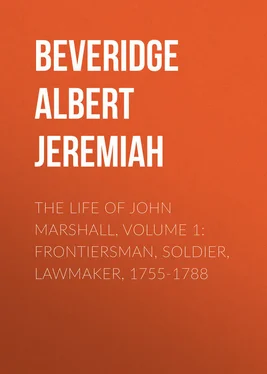"By these resolutions, Mr. Henry took the lead out of the hands of those who had heretofore guided the proceedings of the House." (Jefferson to Wirt, Aug. 14, 1814; Works : Ford, xi, 406.)
Proceedings , Va. Conv., 1775, March 20, 3; July 17, 3, 5, 7.
Henry, i, 255-61; Wirt, 117-19. Except Henry's speech itself, Wirt's summary of the arguments of the conservatives is much the best account of the opposition to Henry's fateful resolutions.
Wirt, 142; Henry, i, 261-66.
Ib. , 271; and Wirt, 143.
In the absence of the positive proof afforded by a record of the "ayes" and "noes," Jefferson's testimony, Washington's vote, Thomas Marshall's tribute to Henry, and above all, the sentiment of the frontier county he represented, are conclusive testimony as to Thomas Marshall's stand in this all-important legislative battle which was the precursor of the iron conflict soon to come in which he bore so heroic a part. (See Humphrey Marshall, i, 344.)
Washington was appointed a member of the committee provided for in Henry's second resolution. (Henry, i, 271.)
Thomas Marshall had been ensign, lieutenant, and captain in the militia, had taken part in the Indian wars, and was a trained soldier. (Crozier: Virginia Colonial Militia , 96.)
Slaughter, 107-08. This was "the first minute battalion raised within this Commonwealth." (Memorial of Thomas Marshall to the Virginia Legislature for military "emoluments"; MS. Archives, Va. St. Lib.) Appendix IV.
Washington to Mason, April 5, 1769; Writings : Ford, ii, 263.
Meade, ii, 219.
Binney, in Dillon, iii, 286.
Ib.
Statement of eye-witness. (Binney, in Dillon, iii, 287.)
Ib. , 288.
In all descriptions of Marshall, it is stated that his eyes were black and brilliant. His portraits, however, show them as dark brown, but keen and piercing.
Binney, in Dillon, iii, 287-88.
Ib.
Binney, in Dillon, iii, 288.
Not only do we find Marshalls, father and sons, taking gallant part in the Revolutionary War, but, thereafter, advocates of war with any country when the honor or interest of America was at stake.
Binney, in Dillon, iii, 288.
Infra , chap. IV.
Slaughter, 107-08. But Binney's informant says that it was twenty miles from the court-house. (Binney, in Dillon, iii, 286.)
Slaughter, 107-08; and certificate of J. Marshall in pension claim of William Payne; MSS. Rev. War, S. F. no. 8938½, Pension Bureau.
Slaughter, 107-08.
Ib.
Campbell, 607-14.
Slaughter, 107-08; certificate of J. Marshall in pension claim of David Jameson; MSS. Rev. War, S. F. no. 5607, Pension Bureau.
Only the Tories and the disaffected were frightened by these back-countrymen. Apparently Slaughter took this for granted and failed to make the distinction.
"The people hearing that we came from the backwoods, and seeing our savage-looking equipments, seemed as much afraid of us as if we had been Indians," writes the chronicler of that march. But the people, it appears, soon got over their fright; for this frontier soldiery, as one of them relates, "took pride in demeaning ourselves as patriots and gentlemen, and the people soon treated us with respect and great kindness." (Slaughter, 107-08.)
Slaughter, 107-08.
Ib.
Campbell, 633-34; Eckenrode: R. V. , 81, 82.
Burk, iv, 85; and Lossing, ii, 535-36.
Marshall, i, 69; and Campbell, 635.
Marshall to Samuel Templeman, Richmond, Sept. 26, 1832, supporting latter's claim for pension; MSS. Rev. War, S. F. no. 6204, Pension Bureau.
For the conduct of the men then in supreme authority in Virginia see Wirt, 166-81; and Henry, i, 333-36; also, Campbell, 636 et seq. ; and see Eckenrode: R. V. , 75.
Marshall, i, 69; and see Eckenrode: R. V. , chap. iii, for the best account that has been given of this important episode. Dr. Eckenrode's narrative is a complete statement, from original sources, of every phase of this initial armed conflict between the patriots and Royalists in Virginia. Also see affidavit of Marshall in pension claim of William Payne, April 26, 1832; MSS. Rev. War, S. F. no. 8938½, Pension Bureau.
Affidavit of Marshall in pension claim of William Payne, April 26, 1832: MSS. Rev. War, S. F. no. 8938½, Pension Bureau.
Memorial of Thomas Marshall. ( Supra , and Appendix IV.)
This uniform was rare; it is probable, however, that Thomas Marshall procured it for himself and son. He could afford it at that time, and he was a very proud man.
Chastellux found the army nearly disbanded from necessity in 1782. (Chastellux, translator's note to 60.)
Washington to President of Congress, Jan. 24, 1776; Writings : Ford, iii, 372-73.
Washington to Reed, Feb. 10, 1776; ib. , 413.
Washington to Committee of Safety of New York, April 27, 1776; Writings : Ford, iv, 51-52.
Washington to President of Congress, Sept. 20, 1776; ib. , 422.
Washington to President of Congress, Sept. 24, 1776; ib. , 439.
Washington to Major-General Lee, Dec. 1, 1776; ib. , v, 62.
General Greene to Governor Cooke, Dec. 4, 1776; ib. , footnote to 62.
Washington to President of Congress, Dec. 12, 1776; Writings : Ford, v, 84.
Washington to President of Congress, Dec. 24, 1776; ib. , 129-30. While Washington was desperately badly off, he exaggerates somewhat in this despondent report, as Mr. Ford's footnote ( ib. , 130) shows.
Washington to President of Congress, Nov. 11, 1776; ib. , 19.
Washington to John Augustine Washington, Nov. 19, 1776; Writings : Ford, v, 38-39.
Washington to President of Congress, Sept. 8, 1776; ib. , iv, 397.
Washington to John Augustine Washington, Sept. 22, 1776; ib. , 429.
Читать дальше












